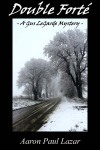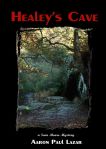Aaron Paul Lazar is the author of three series of mysteries, the LeGarde Mysteries, Moore Mysteries, and Tall Pines Mysteries. He lives in the Genesee Valley in upstate New York, and enjoys the countryside where, in his own words, his characters “embrace life, play with their grandkids and dogs, grow sumptuous gardens, and chase bad guys.” He “writes to soothe his soul.”

You can follow up his work and publications at his website www.legardemysteries.com He has won various awards, listed below along with publishing details of his books. I met Aaron on Twitter, and recently reviewed five of his LeGarde mysteries in this blog. I am glad that he has agreed to be interviewed here and also sent me some of his pictures of the Genesee Valley.
DJ. As you know, Aaron, I am exploring in this blog the phenomenon of the mystery novel. I’m reading various kinds of mysteries, detective novels, thrillers etc., and considering what their appeal to their readers is. I decided to write about your mysteries because, as far as I am concerned, they are something of a genre unto themselves. You have suggested that they might be called, “country mysteries,” and I picked this up in my recent review. Do you think this describes them adequately?
APL: Dorothy, I’ve been trying to figure this out since I started writing these books! I always just called them mysteries, because they felt like elements of the mysteries I’d read my whole life – not exactly like them, but closer than any other genre. Some folks suggested “adventure,” but I didn’t think that really fit, since they aren’t a gun-slinging or sea-diving type of book. One publisher told me they reminded her of the good old-fashioned mysteries of her youth, and I took that to be a compliment! Now, people often die or have died in the past (ala Elsbeth in Double Forté ) in my books, but there isn’t always a murder, so to speak. So they aren’t classic “murder mysteries,” and they certainly aren’t “detective mysteries.” Of course they aren’t crime novels, either, because there is no detective or PI present (except for the cops who are Gus’s friends), and so much more happens in these stories than would be acceptable in a by-the-book crime novel.
 Some people have called them “literary mysteries,” and on
occasion, “cozies,” but they don’t really seem to fit in those
categories either. So I dubbed them “country mysteries,” because they
all take place in the country, the book settings explore and showcase
nature, my characters are soothed by the country (as opposed to the city
or suburbs), and they are
always out in their gardens, or cooking stuff from the gardens, or
walking in the woods, or sledding, or riding horses… it just seemed to
fit. ;o)
Some people have called them “literary mysteries,” and on
occasion, “cozies,” but they don’t really seem to fit in those
categories either. So I dubbed them “country mysteries,” because they
all take place in the country, the book settings explore and showcase
nature, my characters are soothed by the country (as opposed to the city
or suburbs), and they are
always out in their gardens, or cooking stuff from the gardens, or
walking in the woods, or sledding, or riding horses… it just seemed to
fit. ;o)DJ: What do you think about the genre name “cozy mystery?” I balk at using the term for your novels, though they do fit the bill in not being excessively bloodthirsty and in depicting sex in a distinctly romantic way –and in moderation! When someone says of my one murder mystery, “It’s not a cozy,” I tend to regard this as a compliment. Do you feel the same way? Or do you think the term could be profitably applied to your novels? Are they “cozies” to you?
 APL: Yes, I feel the same way about not being categorized as
a cozy writer. I don’t really think they are cozies. There’s much more
pathos and deep-seated emotion and pure evil that invades these books
(like it does your novel!), and it’s not shown in a cozy fashion as
Agatha Christie would have done. Granted, I try to keep the gratuitous
violence and sex down to a bare minimum (the operative word here being
gratuitious), but it’s impossible to avoid violence when you’re talking
about villains like neo-Nazis or sociopaths. For example, I don’t think
in a cozy one would describe the way the eyes of a dead man gelled and
turned gray, as I did at the end of Double Forté with Baxter’s death. And
perhaps one wouldn’t expect so many fistfights, chases, or scenes where
someone has a knife or gun pushed into their ribs in a cozy. I believe
that brings my books beyond the definition of cozy. That said, there are
elements of these books that are comforting, and “cozy” in that manner,
if you know what I mean. When I have Gus LeGarde sitting on his porch
steps with his dog, patting him, with the sun beating down and flowers
bending and swaying around them…it’s comforting for both Gus and the
readers. It may not be critical to the plot, but it’s critical to the
job of getting the readers to know and care about Gus, in my humble
opinion.
APL: Yes, I feel the same way about not being categorized as
a cozy writer. I don’t really think they are cozies. There’s much more
pathos and deep-seated emotion and pure evil that invades these books
(like it does your novel!), and it’s not shown in a cozy fashion as
Agatha Christie would have done. Granted, I try to keep the gratuitous
violence and sex down to a bare minimum (the operative word here being
gratuitious), but it’s impossible to avoid violence when you’re talking
about villains like neo-Nazis or sociopaths. For example, I don’t think
in a cozy one would describe the way the eyes of a dead man gelled and
turned gray, as I did at the end of Double Forté with Baxter’s death. And
perhaps one wouldn’t expect so many fistfights, chases, or scenes where
someone has a knife or gun pushed into their ribs in a cozy. I believe
that brings my books beyond the definition of cozy. That said, there are
elements of these books that are comforting, and “cozy” in that manner,
if you know what I mean. When I have Gus LeGarde sitting on his porch
steps with his dog, patting him, with the sun beating down and flowers
bending and swaying around them…it’s comforting for both Gus and the
readers. It may not be critical to the plot, but it’s critical to the
job of getting the readers to know and care about Gus, in my humble
opinion.DJ: You have written that you turned to writing novels after losing a number of members of your family. You were seeking solace. Why, at such a time, would you choose to write mysteries? In fact your novels are family stories, and the drama within the LeGarde family is by no means all dependent on the mystery plot, though the plot is often moved forward by family dynamics. Could you have just written family novels?
APL: I've always read mysteries, Dorothy. Never much else. They call to me, so it was never even a question what genre I'd write. The scenes with family were comforting, because they reminded me of my loves ones that I'd lost, but the mystery parts of the stories were great escapes for me, too. I never really considered writing “just” about family. I’ve always been excited by the idea of secrets being overturned or mysteries being solved. Maybe I’ll have to consider this some day. ;o)
DJ: I have called your novels “romantic.” You have, it seems to me, a romantic view of love, of family relationships, of the relationship between human-beings and nature. How do you square this with the need in a mystery to introduce all sorts of quite un-romantic things, such as murder, beating and brutal men? You picked up on some comments of mine in my recent review and talked about the “operatic separation of heroes and villains.” Would you like to expand a little on that here?
 APL: I’ll never forget the summer when I took off on my
horse by myself for hours. I’d find a great spot in a pasture, let the
horse eat grass, and I’d read a book either turned around with my elbows
on his soft hindquarters, or on the ground beside him under a tree. My father said, “He’s going through a Romantic stage now.” Heh. I guess I never outgrew it.
APL: I’ll never forget the summer when I took off on my
horse by myself for hours. I’d find a great spot in a pasture, let the
horse eat grass, and I’d read a book either turned around with my elbows
on his soft hindquarters, or on the ground beside him under a tree. My father said, “He’s going through a Romantic stage now.” Heh. I guess I never outgrew it.I think part of my difficulty accepting things not beautiful (un-romantic) has to do with the fact that I was raised in a very sheltered and almost utopian environment. No, we didn’t have much money. But we had all the basics and plenty of love. We had one very old car, one tiny B&W TV, a very cold house in the winter, etc. But we lived in the country (much like I do now) and grew big gardens, had family feasts, took in all the stray animals, and of course, found a way to keep my horse. He wasn’t anything special, but I adored him. We got him for a few hundred bucks from a local woman, but the life I had every day on his back, playing with my pals who also had horses, was so incredible, it just set my expectations for how life is supposed to be. It didn’t cost so much back then to keep a horse. Now you have to be rich, or at least prioritize your life in a different way.
I also flat-out loved opera in my teens and twenties, and went to as many performances as I could. My favorites at the time were Tosca, Carmen, Aida, Rigoletto… talk about romantic! I guess I never progressed beyond the point of showing villains for who they really were. I didn’t worry too much about humanizing them so that the reader felt sympathy. After all, they were the “bad guys.” I know many of today’s writers are quite concerned about character arcs (having their character grow and change) and also that it’s popular to have a seriously flawed hero. I remember my wife originally asked me “why don’t you make Gus an alcoholic, or something interesting like that?” I couldn’t do it! Why? Because I wouldn’t be able to use him then as the example of a good dad, good grandfather, good husband.
I never meant to use my characters as teaching models – not in my conscious brain, anyway. But it seems they have ended up doing just that with many of my readers. One reader actually told me that Gus taught him how to be a better father! Imagine that? I still treasure that comment.
DJ: In all five of the novels that I reviewed, the plot is set in the framework of developing family relationships, and in three of them there are also major subplots that only connect tangentially with the the main mystery plot (the mysterious visitor in Tremolo, the connection to the nineteenth century composer in Mazurka, and the hidden room and Underground Railroad in FireSong). Traditionally, murder mysteries are tightly plotted, more in the style of your Upstaged, and the reader’s attention is firmly directed throughout at the detection of the culprit. Are you deliberately subverting the genre in your subplots, or do these simply pop into your head and you cannot resist them?
 APL: Dorothy, I love your questions. They are so deep and so
far beyond what I’m normally asked! Okay, let’s talk about the subplots
you mentioned first. In Tremolo,
I thought it would be lovely to entwine the feelings and emotions of
1964 in the book in some tangible ways. You know I used Beatles songs,
movies of the time (“To Kill A Mockingbird”), radio programs that hinted
at the fears of the day, like bomb scares and such. But I wanted to
bring closer one of the most powerful events that happened in that
decade, and that was the assassination of the President. By having a
mysterious visitor come to camp, as yes, a definite sub plot, I felt I
could integrate the event more closely to my characters and their lives.
APL: Dorothy, I love your questions. They are so deep and so
far beyond what I’m normally asked! Okay, let’s talk about the subplots
you mentioned first. In Tremolo,
I thought it would be lovely to entwine the feelings and emotions of
1964 in the book in some tangible ways. You know I used Beatles songs,
movies of the time (“To Kill A Mockingbird”), radio programs that hinted
at the fears of the day, like bomb scares and such. But I wanted to
bring closer one of the most powerful events that happened in that
decade, and that was the assassination of the President. By having a
mysterious visitor come to camp, as yes, a definite sub plot, I felt I
could integrate the event more closely to my characters and their lives.In Mazurka, the only way I could get Siegfried to accompany Gus and Camille on their vacation (because I could not imagine leaving him out of this story!) was to concoct a very good reason for him to have to go with them. By having this deep dark secret about Chopin that his great aunt needed to pass on to him, I created the mechanics of him coming along. But remember, there are also many strains throughout the books about Chopin. Elsbeth always adored this composer. Gus is writing a book about him. Gus’s grandson dances around the great room to the strains of Chopin mazurka’s, etc. There were already the elements planted in the series that reached way back in time to this event, making it fit.
 In FireSong,
there are a lot of plot lines. Maybe too many. But I couldn’t help
myself. I wanted to link the criminal activities beneath the church and
town to something historic, to Gus and Camille. By finding the secret
room in their house with Underground Railroad relics in it, I firmly
linked Gus and Camille, and the original owner of their house, Mary
Hill, to the current day happenings in the town. Remember that Mary was
found in a very unexpected place – and it all linked back to those
criminal activities that were ongoing. How else would we have found her
if there hadn’t been the original cave in at the mines? Or the forest
fire? I think it all linked together in important ways, but maybe I had too much going on in this one.
In FireSong,
there are a lot of plot lines. Maybe too many. But I couldn’t help
myself. I wanted to link the criminal activities beneath the church and
town to something historic, to Gus and Camille. By finding the secret
room in their house with Underground Railroad relics in it, I firmly
linked Gus and Camille, and the original owner of their house, Mary
Hill, to the current day happenings in the town. Remember that Mary was
found in a very unexpected place – and it all linked back to those
criminal activities that were ongoing. How else would we have found her
if there hadn’t been the original cave in at the mines? Or the forest
fire? I think it all linked together in important ways, but maybe I had too much going on in this one.DJ: A related question: You have a leisurely approach to narration—in my review I used the word “contemplative”—and some whole sections contribute nothing to the actual plot—e.g., Gus playing with his grandson, Gus and his friends and family cooking, the minister preaching. Do you deliberately slow down the pace of the plot in this way in order then to take your readers by surprise when you throw them into fast-paced chase scene where the narration is highly concentrated and very precise. How much planning do you do of pacing? Or do you, as it were, follow your nose and let the characters and the story lead you?
APL: I do the latter, Dorothy. My characters lead me where they will.
But I also believe that I have always intentionally employed the device of “tension and release, tension and release.” Like a sine wave, actually, I position scenes or vignettes of Gus’s family life in between the action scenes. It’s very purposeful. I think the reason I do it is to make my readers love and care for my characters, to expose their personalities, their weaknesses, their fears. I do it to let the reader relax a little between the tense scenes, and also to make the story seem more real. If all my characters did was run around from or after villains the whole time, that would make my books probably into suspense or terror. But they aren’t, they definitely aren’t. It’s almost become second nature, but this interchanging of relaxed versus tense scenes has always been my intent. I do very little planning, except to collect a few vague ideas about subjects I’ll cover or problems my characters will develop, or new characters I’ll feature. And I don’t outline.
DJ: You are a prolific writer. You did not begin writing novels until about 2004 (if I am right) and since then you have written fifteen, with six on the market now and the rest in the publishing queue scheduled for near term release. I am in awe of this ability since it takes me several years to write one. How do you do it? Particularly when you also hold down a full-time job as an applications engineer—and then there is your family, to say nothing of your garden, your dogs and cats . . .
APL: It isn’t easy, Dorothy. But I budget my time very carefully. I rarely watch television, so that helps a lot. I work hard and fast on the household and garden chores, and I am forever behind. The house is never perfectly clean; the weeds are never fully pulled. There are always fifty jobs waiting for me when I come home. But I figure if we are living in a relatively clean environment, eating fresh produce and healthy meals, etc. then I can take a few hours a night (or early morning) to devote to my books. When I’m writing a book, I do about a chapter a day. Normally it takes about three months to get a draft done when I’m on a roll. After that, it may be years before the book comes out, and it goes through many editing phases. So it’s just a matter of priorities. My wife and family come first, then my writing. All the other stuff can be done whenever I can squeeze it in.
DJ: Your novels show more than a passing involvement with European culture—music, language, some European cities. Mazurka plays almost entirely in Europe, in Paris, in Vienna. And several of your characters have European roots, not only the twins, Elsbeth and Siegfried. Siegfried’s German is even scattered through the texts. Your own life seems to be very well rooted in upstate New York. Where does your interest in Europe come in?
 APL: When I worked for Kodak, one of my jobs was liaison with
our German counterparts in Muelhausen, in our German factory. I loved
this job, and frequently visited for a week or two at a time. In 1986 my
whole family was invited to live in Germany while I worked with my
counterparts there. We lived in Denkendorf, a lovely little village outside of Stuttgart. You’ll see an appearance of Denkendorf in Mazurka, as
well as many of the shops and restaurants we frequented. While we lived
there, my wife and I were able to take long weekend trips to various
locales – Paris, Wien, Austria, the Black Forest, etc. etc. (my in-laws
came along with us to Germany to help care for our three little girls,
and we took turns every other weekend traveling when we could!) Most of
these locales are featured in Mazurka. Now,
years later, I work for a Germany company with headquarters here in
Rochester, NY. I’ve been overseas twice now in the past year and am
delighted to reconnect with the German people and culture.
APL: When I worked for Kodak, one of my jobs was liaison with
our German counterparts in Muelhausen, in our German factory. I loved
this job, and frequently visited for a week or two at a time. In 1986 my
whole family was invited to live in Germany while I worked with my
counterparts there. We lived in Denkendorf, a lovely little village outside of Stuttgart. You’ll see an appearance of Denkendorf in Mazurka, as
well as many of the shops and restaurants we frequented. While we lived
there, my wife and I were able to take long weekend trips to various
locales – Paris, Wien, Austria, the Black Forest, etc. etc. (my in-laws
came along with us to Germany to help care for our three little girls,
and we took turns every other weekend traveling when we could!) Most of
these locales are featured in Mazurka. Now,
years later, I work for a Germany company with headquarters here in
Rochester, NY. I’ve been overseas twice now in the past year and am
delighted to reconnect with the German people and culture.DJ: And now a nuts-and-bolts question:
Many people these days are trying their hand at self-publishing. You have yourself published with small publishing companies and you have had success with e-books. Do you have any advice, based in your own experience:
a) for writers who are interested in self-publishing?
b) for writers who are interested in getting into the e-book market?
Can you make any comments on the current trend towards publishing oneself on e.g. Kindle, doing all the formatting oneself, setting the price, and simply selling.
APL: Dorothy, all I can say is the world is rapidly changing in this arena. People are completely bypassing publishers these days and becoming enormously successful. Or failing miserably. Folks are still snagging good agents and being well represented by big publishers; and others in the same boat get little in the way of promotion or sales. The market is so changeable, the opportunities so open and amazing… and there is no zero sum game here, especially with eBooks.
My eBooks have sold far more than my print books, and I’m delighted with this. My publisher does all the work on formatting, etc. I wouldn’t know where to begin! She is a master at this.
My wife and I are buying probably ten times more books in general now that she has her Kindle and I use my little iPhone to read. A year ago, I would have laughed at the idea, but it has really taken hold and grown. We are constantly downloading books for free or 99 cents that are wonderful reads. Of course, once we hit on an author we like, we gladly go back to research what they’ve written and frequently buy at full price without questioning the cost. So there’s a lesson to be learned here re. promotion.
I wish I had the magic bullet answer – but I think it’s still and always will be the same. Write the best book you can. Put it in the very best polished format. Find a way to get it to your readers, and keep on writing so they will come back for more!
DJ: What are you writing now and where are you going?
APL: I’ve just finished polishing and rewriting my old books – the first two books I wrote, Double Forté and Upstaged. My current publisher (Twilight Times Books) has picked them up and they will come out as “author’s preferred editions” next year. So I’m free to start a new book, and I’m very excited to be in the thinking stages about a third book in my Tall Pines series. I have ten books in LeGarde, three in Moore Mysteries, and two in Tall Pines, so it makes sense to add one to the new Tall Pines series before I go on. I intend to keep writing these three series indefinitely, God willing.
 Next I’ll likely add a book to the Moore series, and then will probably either go back to spruce
up one of the four remaining LeGarde books that is waiting in the
wings, or I’ll write another “young Gus” book. I have two now in that
sub-category of LeGarde Mysteries, and would like to continue that
series within a series. ;o)
Next I’ll likely add a book to the Moore series, and then will probably either go back to spruce
up one of the four remaining LeGarde books that is waiting in the
wings, or I’ll write another “young Gus” book. I have two now in that
sub-category of LeGarde Mysteries, and would like to continue that
series within a series. ;o)11. What kind of audience do you hope to reach?
APL: I must say that originally I never wrote for anyone but me. It was my world, my pleasure, and under my control. LOL. But now, I’ve seen that I can reach and connect with readers of all ages. I have ten year olds who have read and enjoyed Double Forté and 99 year olds who read all the books. It seems my stories span the ages. The Tall Pines series, however, is aimed a little more at women (although I think most men will like it, too). But we shall see how they are received when they come out!
DJ: Anything you would like add?
APL: First of all, thank you so much for these brilliant questions and wish you the very best with your own book, which I loved. Secondly, I’d like to say that connecting with my readers, learning what they liked and didn’t like, seeing how the books impacted them – it’s all my favorite part of being an author. Folks can connect with me on facebook, twitter, or my many blogs. My main website is www.legardemysteries.com. You can also email me at aaron dot lazar at yahoo dot com to sign up for my quarterly newsletter.
Thank you, Dorothy, and don’t forget to write like the wind.

AWARDS:
WINNER 2011 Eric Hoffer BEST Book, COMMERCIAL FICTION * GRAND PRIZE FINALIST Eric Hoffer Book Award 2011 * 2X FINALIST Global eBook Awards 2011 * Preditors & Editors Readers Choice Award – 2nd place 2011* Winner of Carolyn Howard Johnsons’ 9th Annual Noble (Not Nobel!) Prize for Literature 2011 * Finalist Allbooks Editors Choice Awards 2011 * Preditors&Editors Top 10 Finalist * Yolanda Renee’s Top Ten Books 2008 * MYSHELF Top Ten Reads 2008 * Writers’ Digest Top 101 Website Award 2009 & 2010
See also: www.legardemysteries.com / www.mooremysteries.com / www.murderby4.blogspot.com / www.aaronlazar.blogspot.com /www.aplazar.gather.com

No comments:
Post a Comment